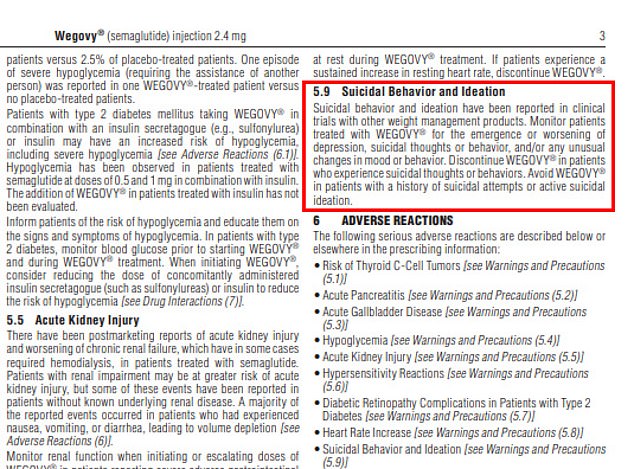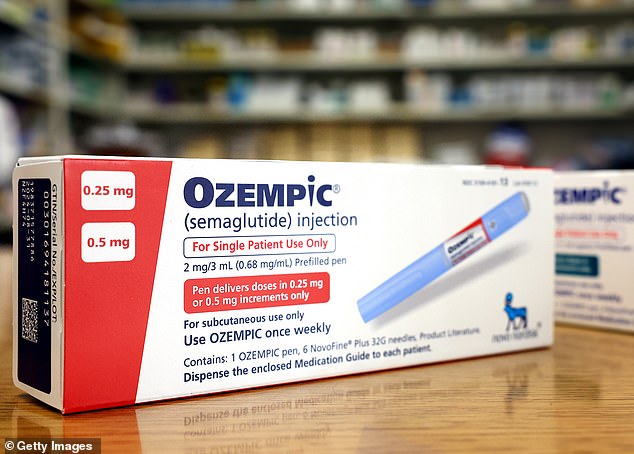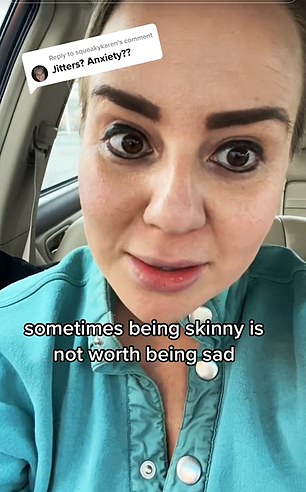Drugs similar to Ozempic and Wegovy could help relieve depression, study in mice suggests.
The researchers found that dulaglutide, which mimics the same GLP-1 hormone as Ozempic, acted on 64 different substances in the body.
These medications have previously been linked to mental health benefits, including a mental boost due to the weight loss they cause.
The results come despite concerns about drugs’ links to suicidal thoughts, and European countries have opened an investigation into the suggestions.
But this has not yet been resolved, and manufacturers point to many cases of patients saying their mental health has improved while taking the drugs.
An FDA investigation published in January found no preliminary link between Ozempic and suicidal thoughts.



Patients who take semaglutide and say it has improved their mental health include Emmalea Zummo, 18, of Pennsylvania (left) and Kaela Beasley, of Minnesota.


Novo Nordisk, which makes Ozempic, says in its warning leaflet that patients taking the drug may also experience suicidal thoughts.
The Chinese researchers wrote in the article: ‘The antidepressant effects of dulaglutide were confirmed in a model of depression.
“These primary data provide new insight into understanding the antidepressant effects of dulaglutide and may facilitate the use of dulaglutide as a potential therapeutic strategy for depression.”
Dulaglutide is used in the drug Trulicity, manufactured by Eli Lilly, which is available by prescription for patients with type 2 diabetes.
Patients taking the drug lost 10 pounds in an average of 52 weeks, studies suggest. In comparison, those taking semaglutide lose 33 pounds in 68 weeks according to studies.
In the article, published today in the magazine Brain and behaviorThe scientists studied sixty mice, all seven weeks old.
The rodents were divided into four equal groups: one group served as a control while the other three were exposed to daily stress.
Two of the three stress-exposed groups also received dulaglutide injections twice a week at doses of 0.3 and 0.6 milligrams (mg).
For four weeks, mice were exposed to at least two environmental stressors per day, including food or water deprivation for 12 hours, cage tilting for 24 hours, and wet bedding for 24 hours.
Then, all the mice were subjected to three tests to check their stress levels.
In the first, they were placed in the middle of a field and monitored for five minutes. They were also forced to swim in open water for six minutes and hung by their tails for six minutes.
The scientists said that mice that moved less during these tests were more likely to be depressed.
The results showed that mice that had not been exposed to any stress for four weeks were the most mobile and least likely to be depressed.
They were followed by the two groups of mice that were administered dulaglutide.
Mice that had not received dulaglutide but had been stressed moved the least, showing that they were more likely to be depressed.
The trial results will now need to be repeated in other animals, including primates and humans, to show that dulaglutide can reduce depression.


Scientists say it is possible that drugs like Ozempic could ease feelings of depression (file image)




Pictured above are two patients who have reported bad moods while taking Ozempic or a similar medication using semaglutide. The patient on the left said that after three weeks on the medication she felt “like shit,” while the patient on the right said, “Sometimes being skinny isn’t worth being sad about.”
But scientists at Hebei Medical University argued that their results showed that GLP-1 drugs can have an antidepressant effect.
Among people who previously reported antidepressant effects while taking these medications is Emmalea Zummo, a 17-year-old from western Pennsylvania.
He lost more than 70 pounds while taking semaglutide, and his weight dropped from 250 to about 180 pounds in 68 weeks. But in addition to losing weight, she also said her depression improved.
She said NBC News: ‘I was diagnosed with depression because of my weight.
“(But) even on the first appointment, when they explained to me what the medication was, it was already like I felt lighter mentally.”
She added that she was “really happy” about the weight loss, adding: “I felt better in my own skin, which is something I’ve never felt before.”
Another patient who said the medication helped her depression is Kaela Beasley, who lost 85 pounds after nine months taking Wegovy.
“I was having a very bad relationship with food, taking medication for depression and generally being unhappy (before losing weight),” she said online.
‘(But now) I’ve changed my eating habits, I’ve been consistent with therapy, I move a lot more and I really wake up and try to be a better version of myself every day.
“When you’re struggling mentally with everything and making extremely unhealthy choices with food, it’s okay to ask for help.”
Doctors say the medications can indirectly help relieve depression because of the weight loss they cause, making people happier with themselves.
But others have warned that they could also have the opposite effect by eliminating the stress coping mechanism: food.
Several patients have said they began to feel depressed and suicidal while taking the medications.
Wegovy also carries a warning on its label that a possible side effect of the medication could be depression.
Scientists are analyzing a number of pathways in the brain to establish how weight loss drugs can help relieve depression.
